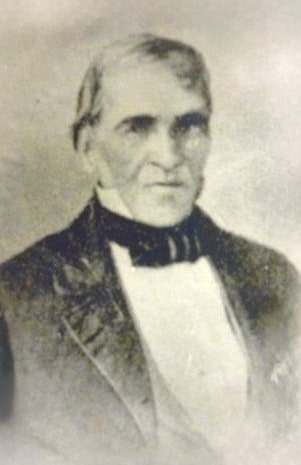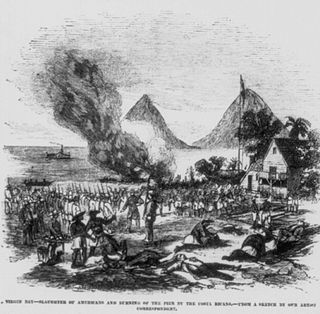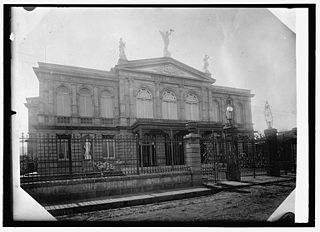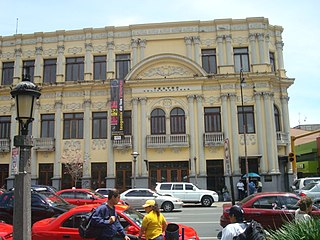
William Walker was an American physician, lawyer, journalist, and mercenary. In the era of the expansion of the United States, driven by the doctrine of "manifest destiny", Walker organized unauthorized military expeditions into Mexico and Central America with the intention of establishing slaveholding colonies. Such an enterprise was known at the time as "filibustering".

Juan Rafael Mora Porras was President of Costa Rica from 1849 to 1859.

Juan Santamaría Rodríguez was a drummer in the Costa Rican army, officially recognized as the national hero of his country for his actions in the 1856 Second Battle of Rivas, in the Filibuster War. He died in the battle carrying a torch he used to light the enemy stronghold on fire, securing a victory for Costa Rica against American mercenary William Walker and his forces. Thirty five years after his death, he began to be idolized and was used as a propaganda tool to inspire Costa Rican nationalism. A national holiday in Costa Rica, Juan Santamaría Day, is held annually on April 11 to commemorate his death.

Alajuela is a district in the Alajuela canton of the Alajuela Province of Costa Rica. As the seat of the Municipality of Alajuela canton, it is awarded the status of city. By virtue of being the city of the first canton of the province, it is also the capital of the Province of Alajuela.

António Pinto Soares was Head of State of Costa Rica from September 11 to September 27, 1842.

Patricio Rivas was a wealthy liberal Nicaraguan lawyer and politician, member of the Democratic Party, who served as Acting Supreme Director of Nicaragua from June 30, 1839 to July 27, 1839 and from September 21, 1840 to March 4, 1841. Later he served as a president of one of the several competing governments of Nicaragua from October 30, 1855 to June 24, 1857. However, he was merely a puppet president; rule was held by William Walker.

The Second Battle of Rivas occurred on 11 April 1856 between Costa Rican militia under General Juan Rafael Mora Porras and the Nicaraguan forces of American mercenary William Walker. The lesser known First Battle of Rivas took place on the 29 June 1855 between Walker's forces and the forces of the Chamorro government of Nicaragua.

The Filibuster War or Walker affair was a military conflict between filibustering multinational troops stationed in Nicaragua and a coalition of Central American armies. An American mercenary, William Walker, invaded Nicaragua in 1855 with a small private army. He seized control of the country by 1856, but was ousted the following year.

José María Cañas Escamilla was a Salvadoran military figure. He was born in Suchitoto, El Salvador.

The Supreme Court of Costa Rica is the court of greater hierarchy of Law and Justice in Costa Rica.

The following is an alphabetical list of topics related to the Republic of Costa Rica.

José María Alfaro Zamora was the Costa Rican Head of State between the periods of 1842 and 1844 as well as 1846 and 1847 and President of Costa Rica between May 1 and May 8, 1847.

The Constitution of Costa Rica is the supreme law of Costa Rica. At the end of the 1948 Costa Rican Civil War, José Figueres Ferrer oversaw the Costa Rican Constitutional Assembly, which drafted the document. It was approved on 1949 November 7. Several older constitutions had been in effect starting from 1812, with the most recent former constitution ratified in 1871. The Costa Rican Constitution is remarkable in that in its Article 12 abolished the Costa Rican military, making it the second nation after Japan to do so by law. Another unusual clause is an amendment asserting the right to live in a healthy natural environment.

The Free State of Costa Rica was the name acquired by Costa Rica after its split from the Federal Republic of Central America in 1838 and until the proclamation of the First Costa Rican Republic in 1847.

The Liberal State is the historical period in Costa Rica that occurred approximately between 1870 and 1940. It responded to the hegemonic dominion in the political, ideological and economic aspects of liberal philosophy. It is considered a period of transcendental importance in Costa Rican history, as it's when the consolidation of the National State and its institutions finally takes place.

The history of the Costa Rican legislature is long and starts from even before its formal independence from the Spanish Empire. Costa Rica is one of the world's oldest democracies, thus, its parliamentary history dates back several centuries.

The Political Constitution of the Free State of Costa Rica promulgated on April 9, 1844 was the second constitution of the country, if local constitutions are excluded when it was a member of the Central American Federation, and eight if these are included. Francisco Morazán's regime was toppled by José María Alfaro Zamora. Zamora as interim ruler, on April 5, 1843, convened a Constitutional Assembly that was officially established on June 1 of that year and drafted the Constitution that would be in force until 1847 when, Alfaro again, summons a new Constituent.

The coup d'état of April 27, 1870 in Costa Rica was a coup implemented by the military leadership led by Tomás Guardia Gutiérrez and it established, to a large extent, the inauguration of the Liberal State. It also enacted the Costa Rican Constitution of 1871, the longest in Costa Rican history as it remained in force until 1948.
Florentino is both a masculine given name and a surname. Notable people with the name include:














